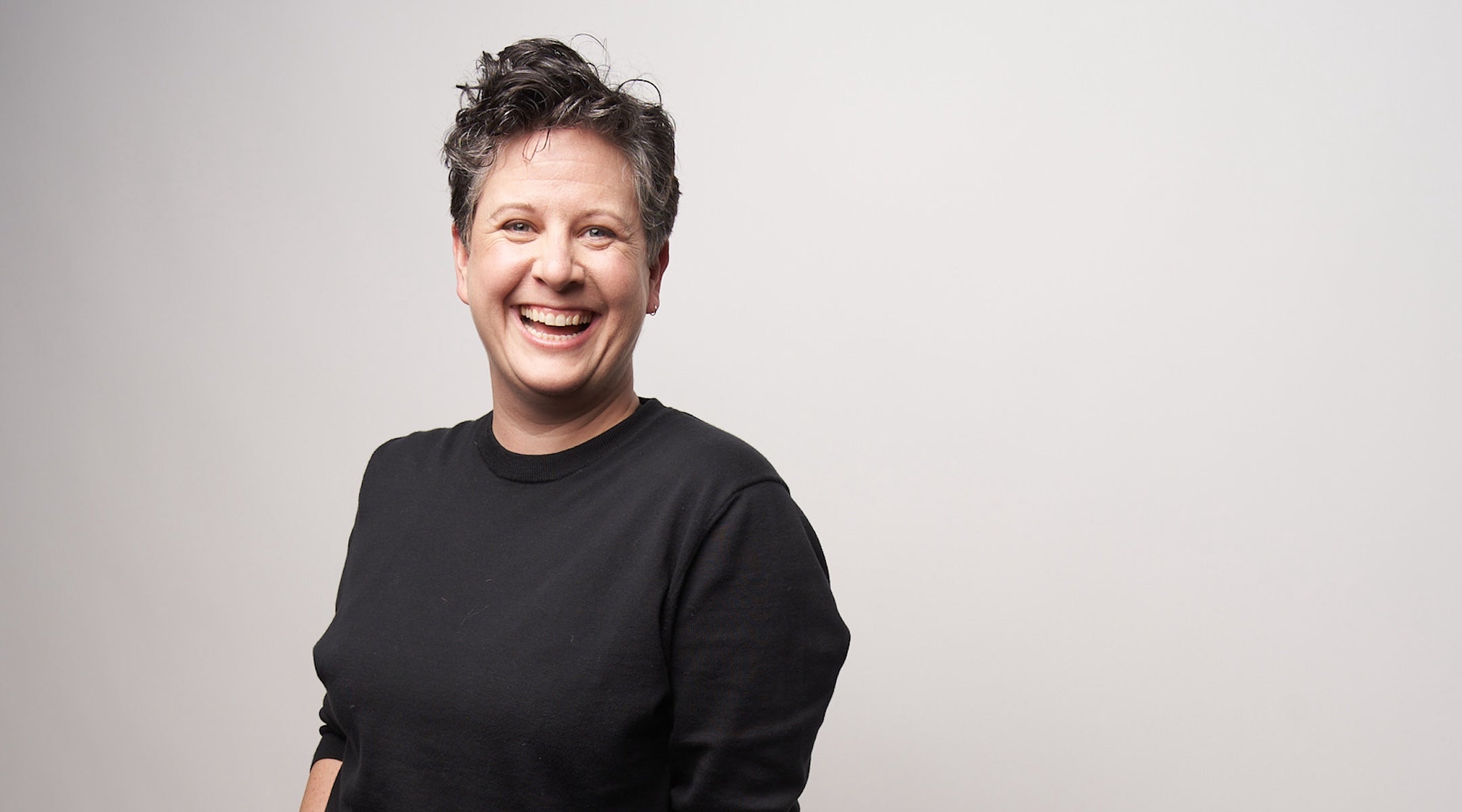Stand-up comedian Liz Glazer leads a very Jewish life — and she talks all about it in her first-ever special, released on YouTube earlier this month, titled, “Do You Know Who I’m Not?”
Filmed at the South Orange Performing Arts Center, near where Glazer lives in Essex County, New Jersey, Glazer’s special covers a variety of Jewish subject matter, including her experience being married to a rabbi, being the granddaughter of four Holocaust survivors (“a perfect score!”), and the general idea of anxiety — which, Glazer says, probably has something to do with said grandparents.
Directed by Josh Edelman, the 40-minute special was released earlier this month — on the same day that she made her debut appearance on “The Tonight Show with Jimmy Fallon.” (Glazer got the call about “The Tonight Show” when she was “on the way to what turned out to be a celebratory mammogram,” she said.)
A couple weeks later, the New York Jewish Week sat down with Glazer for lunch at Miriam, the Israeli restaurant on the Upper West Side — a longtime favorite of the 45-year-old, who’s lived in Jersey nearly all her life, though she went to high school at Ramaz, a Modern Orthodox school on the Upper East Side. Between bites of sabich, we chatted about rabbinic sermons, her former career as a lawyer, and being gay now compared to when she came out in 2001.
This interview has been lightly condensed and edited for clarity.
What can audiences expect from “Do You Know Who I’m Not?”
It feels like a big night out. The nature of the place that we filmed [SOPAC] — it was big, it was bold. I think it’s very Jewish. It’s longform storytelling with hard punchlines. And it’s very personal.
How does your Jewishness show up, in this special and throughout your comedy?
All the time. Any joke that’s born out of anxiety can be traced back to generational trauma and anxiety, and that’s the reason that my whole family was and is funny, because we’re always like, ‘Oh my God, what could happen?’ Which, then you have to laugh, or else you’ll be concave in a corner, you know?
Were you a class clown growing up?
I was not. I was “observe, take note,” and then my friend Shira [Ackerman] would notice me and laugh, and Shira would say something, and I would say something back, and that was the joke. And — side note — person who edited my Tonight Show set? Same Shira, from first grade. I ran for senior vice president of Ramaz — we were up the night before the speech day, with her editing me. ‘95 to 2025, same thing.
Who are some of your biggest comedy influences?
Maria Bamford, Joan Rivers, Judy Gold, Myq Kaplan. And my mom.
Your wife, Karen Glazer Perolman, is the senior associate rabbi at Temple B’nai Jeshurun in Short Hills, New Jersey. What’s something about being married to a rabbi that you weren’t necessarily expecting?
She really has a lot of people and families in mind at all times, because her practice as a rabbi — the level of connection that she has with every single person in this huge temple is beyond what I can imagine. And knowing people through all their life phases, like, “I named their baby, I bar mitzvahed that baby, then unfortunately a grandparent died and I did the funeral.” Just following people through their lives, the extent of how deep those relationships go, and what that means for our schedule — I don’t think I quite got [it]. Because you can’t until you live it. And, you can’t go for dinner anywhere without, like — she knows everybody.
Do you ever pitch her sermons, or vice versa with stand-up jokes?
Oh my God, Joe, are you in our couples therapy sessions? OK here’s the thing: My favorite genre of anything? Sermon. I love a sermon. A close second is graduation speech. I want to be inspired, at all times. And my wife is an amazing joke writer. I would argue, probably any of my joke jokes, Karen wrote it. Because she’s good at that. I’m fine.
Karen gave birth to your child, Eloise, back in 2023. How has being a parent changed your life and your work?
It’s made me more focused. I’ve heard other people talk about this, that they kind of click into a business element of comedy a little more when they have a kid, because you’re like, “OK, daycare is this much.” In terms of substance, I think it’s allowed me to put paramount living, and just trusting that funny things will happen. Because they do, all the time. So I’m just writing everything down — which I was before, but there’s more of it, and it feels richer and more alive. Thank God and knock on wood — I do knock on wood even though I’m Jewish because I hedge my bets. Apparently it could have Christian connotation.
How funny is Eloise?
She wrote her first joke. It was written by her teacher — they send us messages from the school. And they were like, “We did a painting activity today, and there were three [kids] there, so we asked them what they painted. Violet said she painted flowers, Remy said she painted dinosaurs — Eloise said she painted paper.” And I was like, “That’s perfect.” Just literal, to the point, like a regular Mitch Hedberg.
You mention in your special how coming out was so terrifying, but that things were so different a couple decades ago — and that now, on the other hand, everyone is gay. Is there anyone left who isn’t gay?
My mom, and I kind of wish she was. Because she’s dating, and I — I wish she was at least bi. Only because I want her to be happy. She’s going out with Herb, and Merv, and there’s no chemistry. And I’m like, shocking.
You had a previous career as an attorney for two years, and as a law professor for nine. Your comedy career has taken off at this point, but along the way, have people in your life ever encouraged you to consider returning to law?
Yes. Whenever someone’s like, “You could fall back on this,” I’m like, there would be so much paperwork and a line waiting for being on hold — which, I do like being on hold, honestly. That’s the only time I ever get anything done. Give me a customer service number to call for a hard errand and — you know what? That’s how I’m gonna write my pilot.
Are there any transferable skills between the two careers?
I feel like a lot of the way I talk would be OK for filibustering. It’s fun to go on a tangent.
How was your first ever stand-up experience?
It went really well. I mean, not in an objective sense — I think I could tighten it up if I listen back to it. But despite the fact that it wasn’t perfectly punctuated jokes, it was very me. And then what would happen is, years into it, I got better, but I also got worse. Because as I learned to be a better joke writer, I went through a phase of hiding more of me. So you go through a process of integrating the you that you’ve become with a more developed voice, with the knowledge of the craft that you’re trying to incorporate, to make that voice heard and package it for people.
Are you more of a Type A or Type B personality?
I think it depends on when. Also I don’t really know the definitions of the types. (Laughs) I mean right and left is still hard.
What’s your favorite Jewish food?
I don’t like gefilte fish. However, my mother makes a tri-color, three-layer gefilte fish terrine. One layer is horseradish, one is spinach and one is carrots. And it’s really delish.
What was it like growing up here?
I grew up just outside of here — which is a fact that anyone from here will remind you of constantly. I get it, you know, I was from Bergen County. But I went to high school here [at the Ramaz School]. I was classmates with Natasha Lyonne, just saying. One time I asked her to sign my vocab book, because she was already famous, and she signed my name, which was such a good prank. Also if you’re gonna write about me and Natasha Lyonne, I need this underlined and bolded and everything: We weren’t friends, and that was because she would never have been friends with me, because there was no reason to be friends with me. She was cool, I was not. At all.
Do you have a favorite part of NYC?
I love the Upper West Side. I lived here when I was born, and so I have a special connection to it. Oh, and you don’t have to pay congestion pricing, which is a very Jewish reason to like a neighborhood.
Jewish stories matter, and so does your support.




